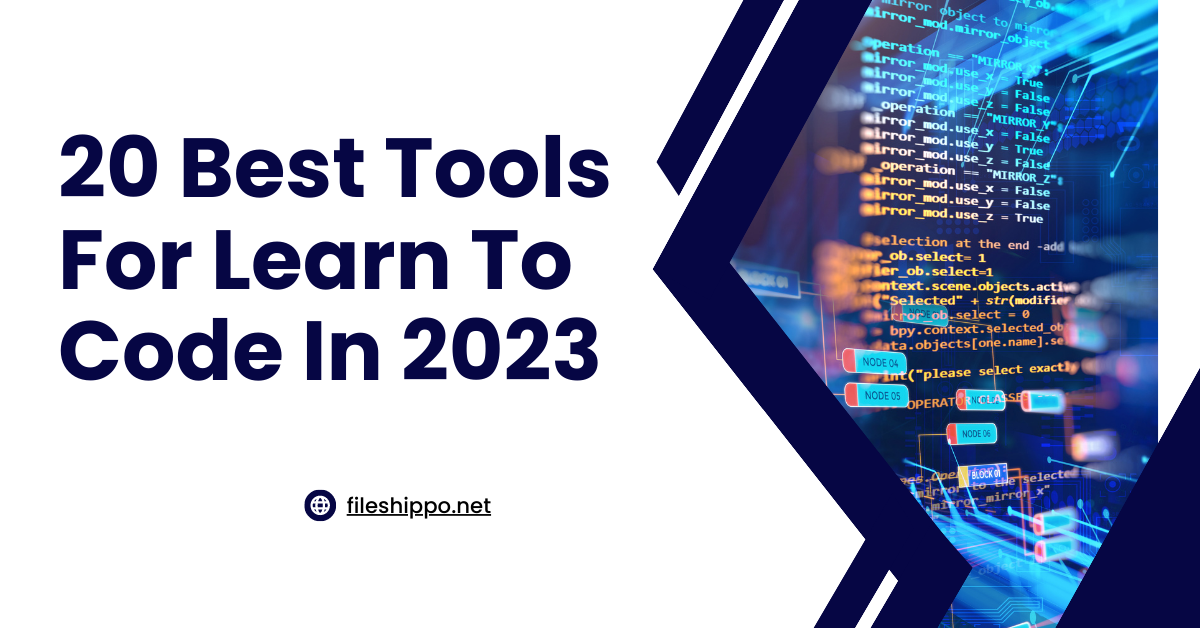Are you interested in learning how to code but unsure where to start? With the abundance of online resources and tools available, it can be overwhelming to determine which one is the best fit for your needs. Coding is a highly valuable skill that can open up many career opportunities. However, learning how to code can be challenging, especially for beginners just starting out. Fortunately, there are many tools available that can help make the learning process easier and more effective.
Read More About: What Is The Fast & Quick Way To Become A Software Developer in 2023?
Table of Contents
How to Start Learn to Code
If you’re interested in learning how to code, then with the right approach, here are some tips to help you get started:
- Identify Your Goals: Before you start learning to code, it’s important to identify your goals. What do you want to accomplish with your coding skills? Do you want to develop an app or website, or do you want to use coding skills to improve your current job?
- Choose a Programming Language: Once you’ve identified your goals, you can choose a programming language to help you achieve them. Popular programming languages include Python, Java, and Ruby.
- Find a Learning Resource: Many different resources are available for learning to code, including online courses, books, and tutorials. Choose a learning resource that suits your learning style and schedule.
- Practice Coding Regularly: To become proficient at coding, you need to practice regularly. Set aside time each day or week to work on coding projects and seek feedback from others to improve your skills.
Where to Learn to Code
There are many different resources available for individuals looking to learn to code. Some of the most popular options include:
- Online Resources: Online resources such as Codecademy, Udemy, and Coursera offer various courses on different programming languages and topics. Many of these resources are free or low-cost and offer the flexibility to learn at your own pace.
- Coding Bootcamps: Coding bootcamps offer intensive, immersive courses that teach individuals the skills they need to become proficient coders quickly. While these programs can be expensive, they often offer job placement assistance and networking opportunities.
- University Courses: Many universities offer courses in programming languages and computer science. While these courses can be expensive, they offer the benefit of a structured learning environment and the opportunity to earn a degree.
- Workshops and Conferences: Workshops and conferences offer the opportunity to learn from experienced coders and network with others in the industry. While these events can be expensive, they offer valuable opportunities to learn new skills and make connections.
20 tools that can help you learn how to code
W3Schools
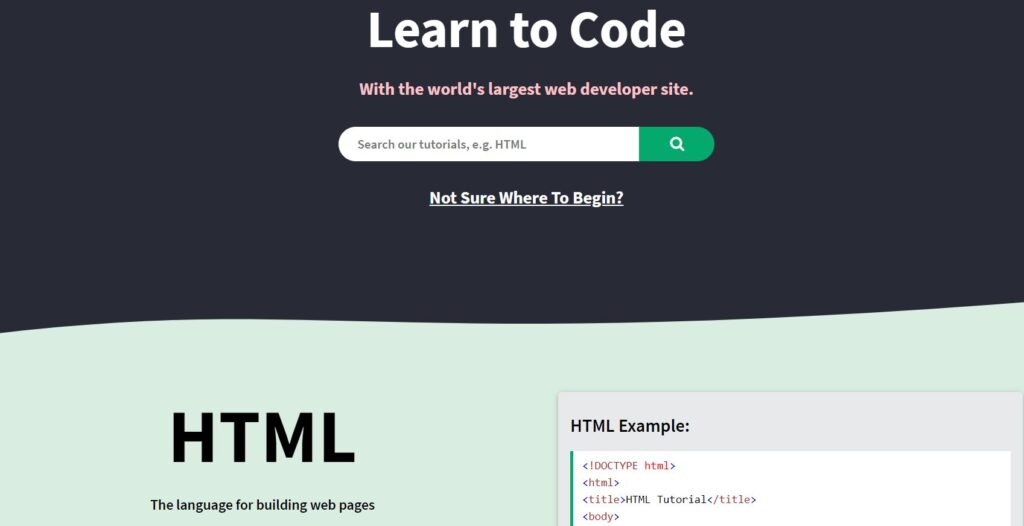
W3Schools offers tutorials and references covering web technologies, HTML, CSS, JavaScript, PHP, AJAX, ASP.NET, React, Vue.js, Angular, and more. They provide examples, code snippets, tables, references, cheat sheets, certifications, and forums.
Pros:
- Large community support through forums.
- Practical examples, references, and code samples.
- Comprehensive, up-to-date resources for learning web languages and frameworks.
Cons
- Content can get outdated quickly.
- Not optimized for mobile-friendliness.
MIT Open Courseware
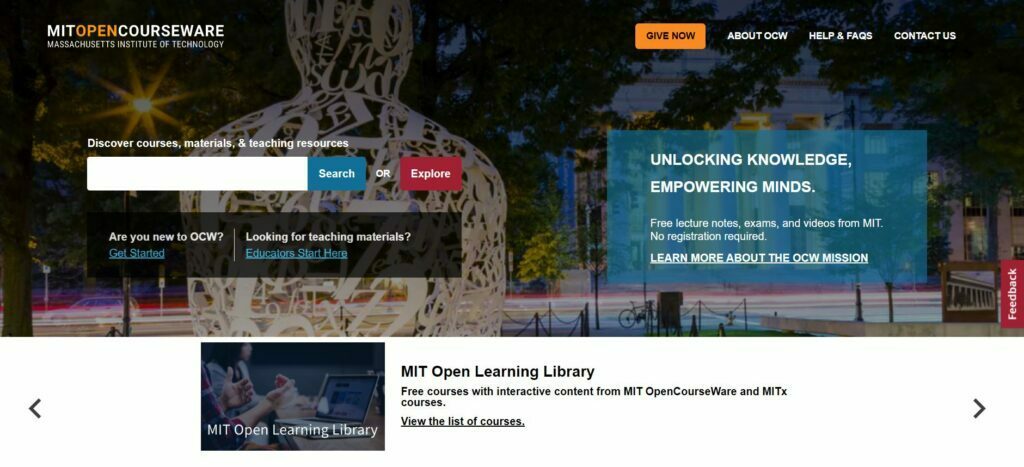
MIT OCW provides open-access resources to code learning, including course materials, syllabi, lecture notes, assignments, exams, videos, simulations, and more from MIT courses.
Pros
- High-quality content from the world’s leading research university.
- The breadth of subject areas covered, including sciences, humanities, and technologies.
- Rich educational materials include lecture notes, problem sets, exams, simulations, educational technologies, and course videos.
Cons
- Provides little guidance.
- Content may be too high-level or advanced for some beginners.
The Odin Project
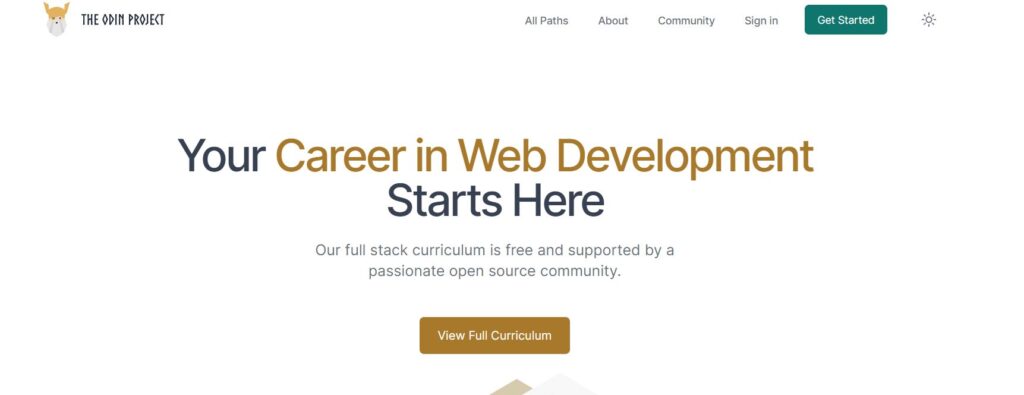
The Odin Project is a free interactive coding curriculum for learning web development. It offers project-based courses to learn full-stack web development using languages like Ruby, JavaScript, HTML, and CSS. Students can build real projects like websites, web apps, and games.
Pros
- Can build projects to apply concepts and skills.
- Courses on modern web languages and technologies.
- Entirely free to use and learn from. No fees or subscriptions.
Cons
- Fewer students and contributions compared to larger platforms.
- Limited courses on other in-demand topics like data science, Android/iOS development, etc. The focus is on web development.
GA Dash
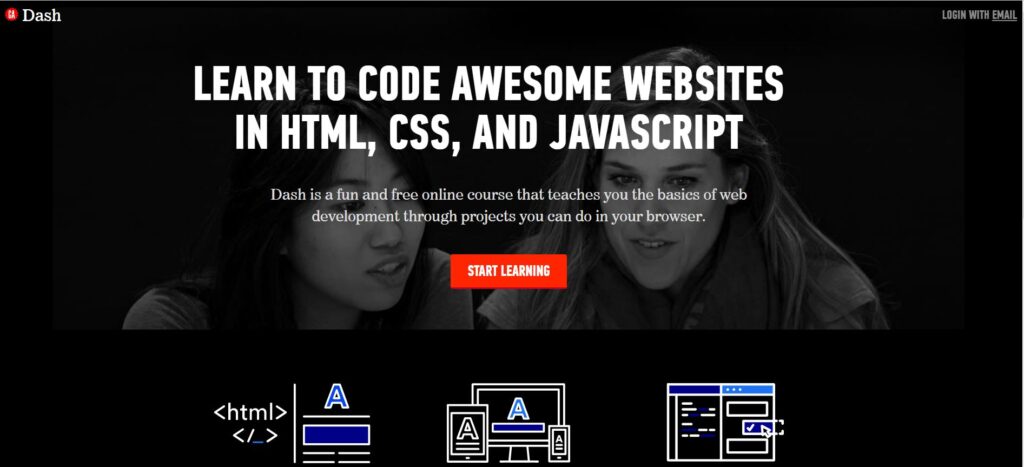
General Assembly Dash provides a catalog of paid and free coding courses for learning web development, mobile app development, data science, software engineering, and more. Courses include video tutorials, hands-on projects, assessments, and lifetime access. Some courses offer verified certificates.
Pros
- Wide range of courses across popular coding and tech domains.
- Courses from industry experts with experiences from Facebook, Google, Amazon, etc.
- Options for paid and free courses.
Cons
- Most free courses have limited scope and depth. Paid courses are required to learn sufficiently.
- Fees apply for a majority of courses and resources. The platform may not be affordable for learners on a budget.
GeeksforGeeks
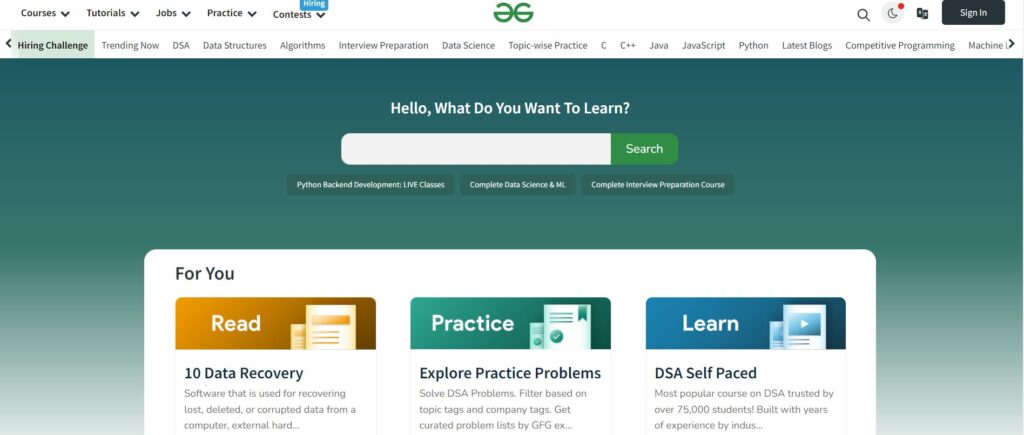
GeeksforGeeks is a non-profit platform that provides resources for learning programming, algorithms, and data structures. It contains tutorials, problems, sample codes, articles, and videos for languages like C++, Java, Python, JavaScript, etc.
Pros
- Entirely free to use all resources on the platform.
- Thousands of problems and solutions to improve coding skills.
- Massive collection of in-depth technical articles and tutorials on various topics.
Cons
- Lack of structured courses or curriculum.
- Difficult to navigate and find specific resources.
Code Avengers
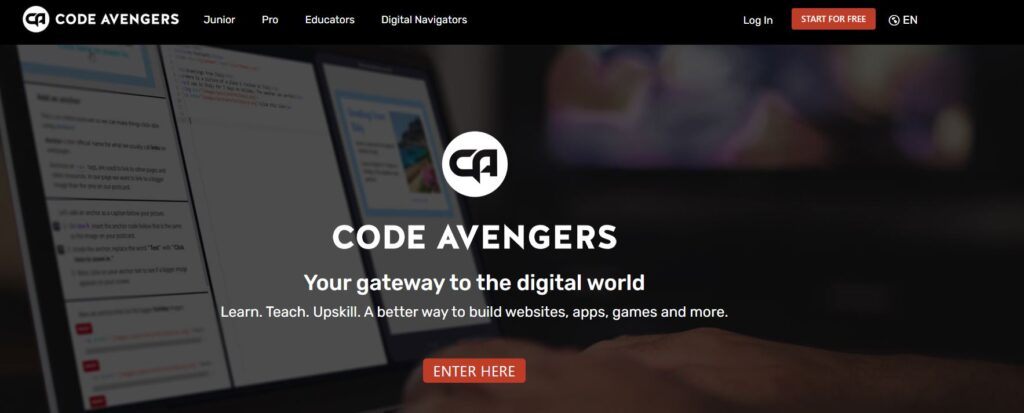
Code Avengers offers coding courses for kids focusing on project-based learning through fun stories and games. They teach block-based and text-based coding using Scratch, Python, JavaScript, and HTML/CSS.
Pros
- An engaging and motivational approach to teaching coding basics to children.
- Uses visual block-based coding and incremental progress through projects to build confidence and skills.
- Covers the fundamentals of sequencing, logic, problem-solving, and code syntax in a kid-friendly manner.
Cons
- Targeted at teaching young learners; thus, not suitable for adults or advanced coders.
- Online coding teacher support is limited since the primary focus is interactive lessons and coding challenges.
- little-to-no integrations with other technologies, frameworks, or subjects outside web development basics.
Khan Academy
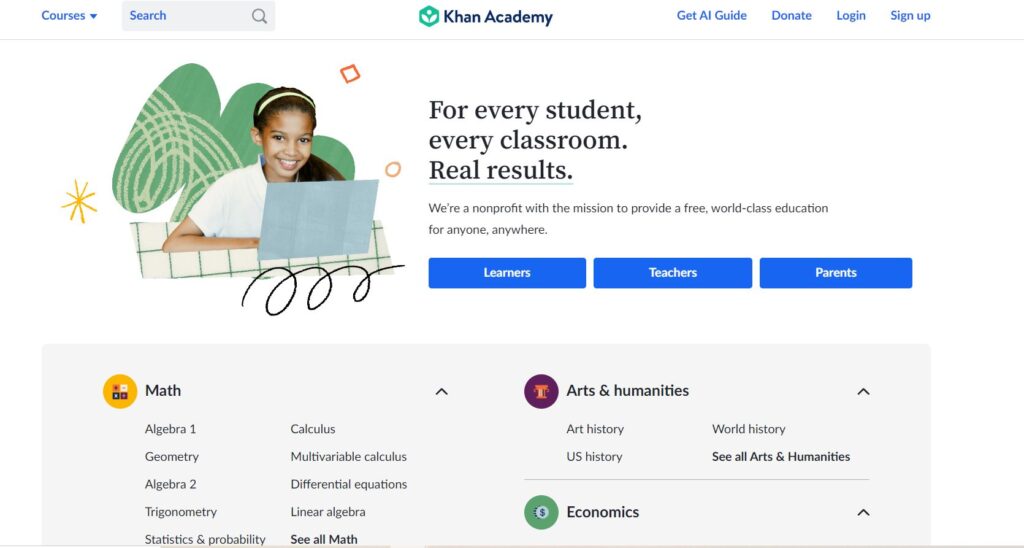
Khan Academy is a non-profit organization that provides free online educational resources, including video lessons, practice exercises, and tools for educators. It covers math, science, economics, art history, and more.
Pros
- Completely free to use.
- Thousands of video lessons with examples and practice problems.
- Lessons cover pre-algebra through early college education in various subjects.
Cons:
- Not all courses have direct oversight from instructors. Some content may be outdated or inaccurate.
Coursera
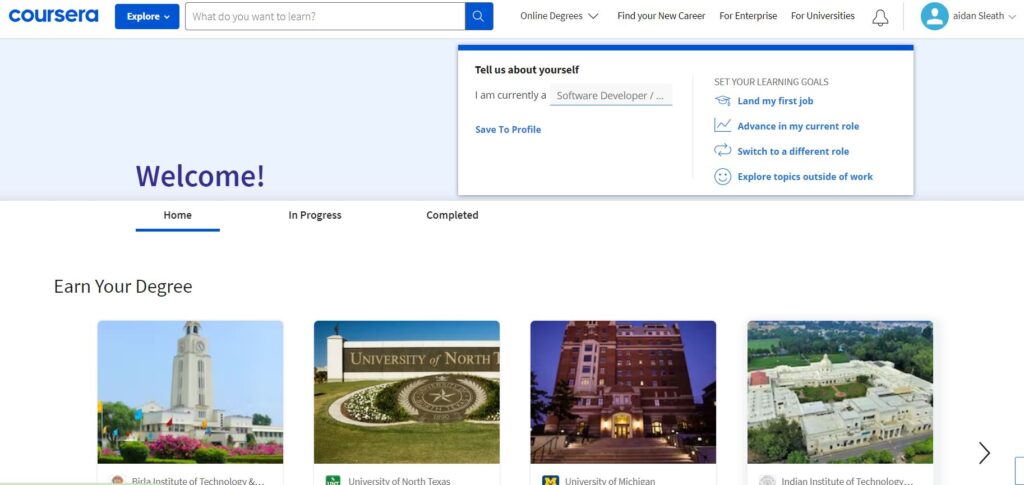
Coursera offers free and paid online courses from top universities and organizations. It includes courses in business, computer science, mathematics, arts and humanities, and social sciences. Courses include video lectures, assignments, quizzes, and discussions. Some courses offer verified certificates upon completion.
Pros
- The platform is well-designed and easy to use.
- Verified certificates available for some courses.
- Courses from leading universities and companies.
Cons
- Programming and coding courses are limited.
- Limited courses in the areas of science, medicine, or engineering.
- Many courses charge high fees for verified certificates or course materials.
Code.org
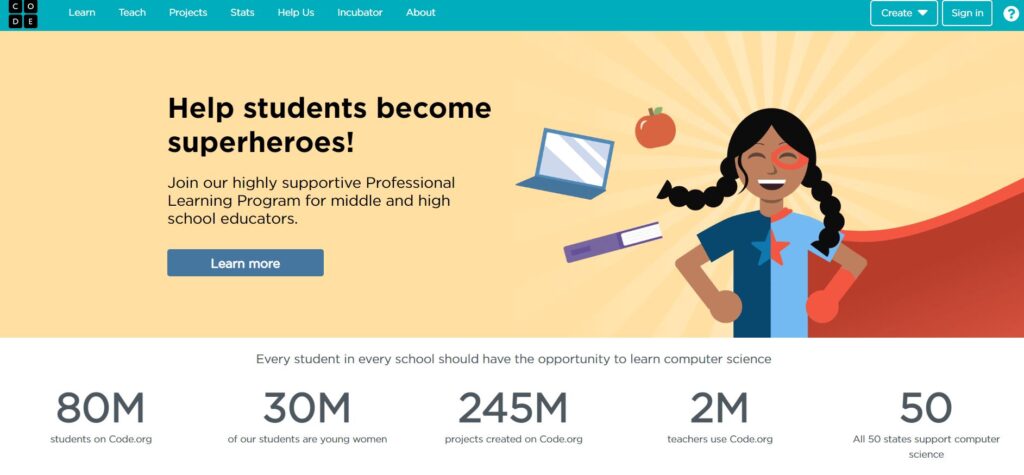
Code.org is a non-profit dedicated to expanding access to computer science education for all. It offers resources for students and teachers to learn and teach coding.
Pros
- Resources for teachers to implement coding in their classrooms.
- Focused on teaching coding and programming concepts and skills.
- Courses are project-based, interactive, and available for learning languages like Python, Java, C++, JavaScript, etc.
Cons
- Less practical projects.
- Limited courses in other subjects outside of computer science and programming.
HackerRank
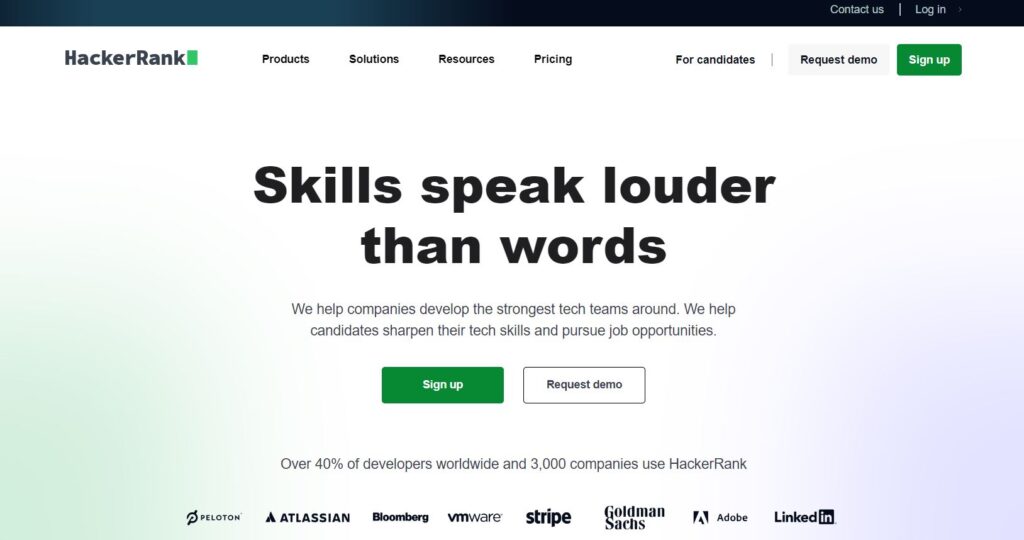
HackerRank is a platform that allows programmers to solve thousands of unsolved coding challenges in 30+ programming languages. It can Find and solves various programming issues. Users can solve challenges to level up their profiles and claim prizes.
Pros
- Potential to win prizes for solving challenges.
- Leaderboards and achievements to compete with other programmers.
- Huge repository of real-world coding challenges and problems to solve.
- Options to practice problems in over 30 popular programming languages.
Cons
- Solutions are not explained.
- Mostly focused on coding challenges and competitions rather than courses or tutorials.
- Limited discussions and interactions require strong prior programming language knowledge to start. Not suitable for beginners.
Code Conquest
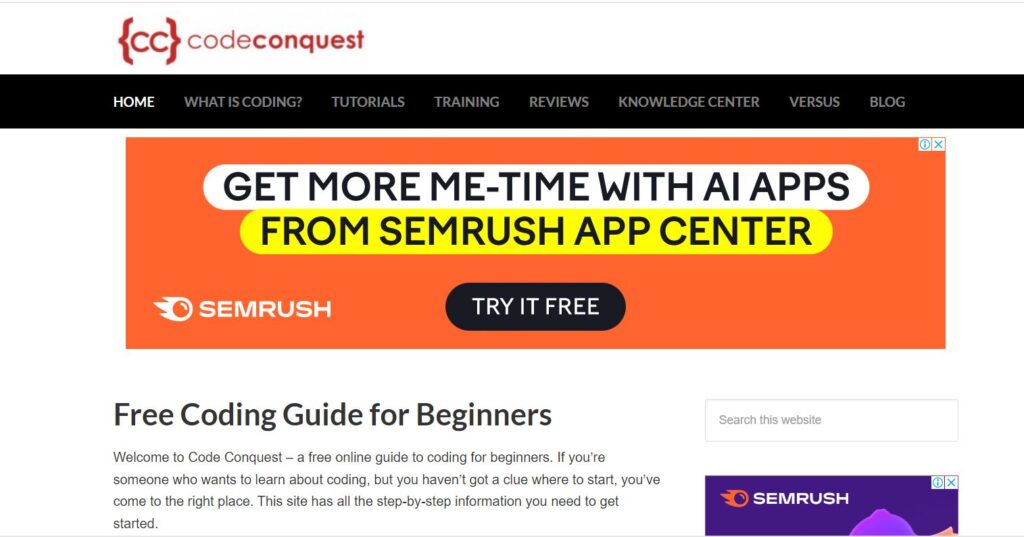
Code Conquest is a platform for learning algorithms, data structures, and programming concepts through challenges and interactive coding exercises. It contains tutorials, examples, and practice problems on algorithms, data structures, machine learning, game development, web development, and more.
Pros:
- Interactive coding window to write and run codes.
- A blend of theory, examples, tutorials, and hands-on practice challenges.
- Coverage of popular programming topics like algorithms, data structures, ML, web/game dev, etc.
Cons
- Limited structured courses.
- The theory is only partially covered.
- Run time errors or logical reasoning are not explained.
BitDegree
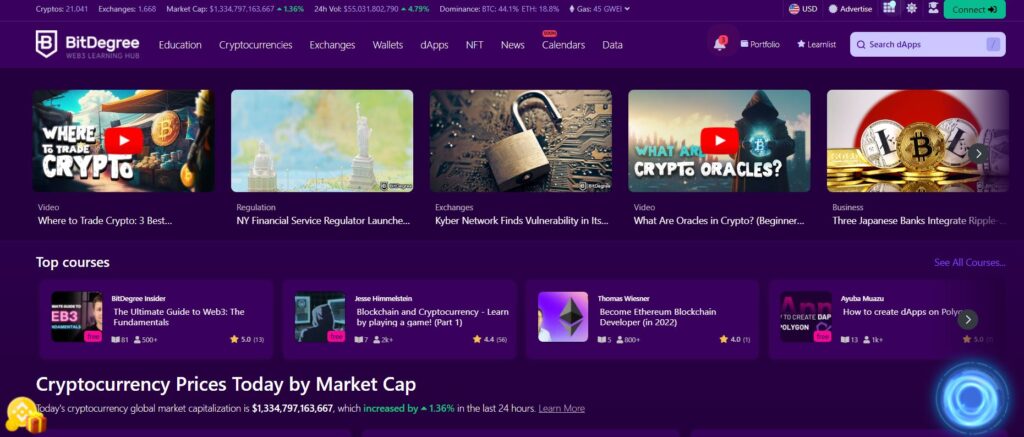
BitDegree is an online learning platform providing high-quality business, technology, and design courses. Instructors upload video courses, and providers can edit or take down any course that violates quality standards. Students use course progress to earn points and rank up levels to unlock more course selections. Certificates of completion are available upon finishing some courses.
Pros
- Build a record of achievements and skills learned.
- Wide range of courses covering business, marketing, tech, and UX design.
- Can earn points and level up profiles by progressing in courses. Unlock access to more courses and resources.
Cons
- Mixed quality of courses.
- Most courses are paid. Limited free options.
- Lacks extra features for collaboration, discussions, or building projects.
Upskill
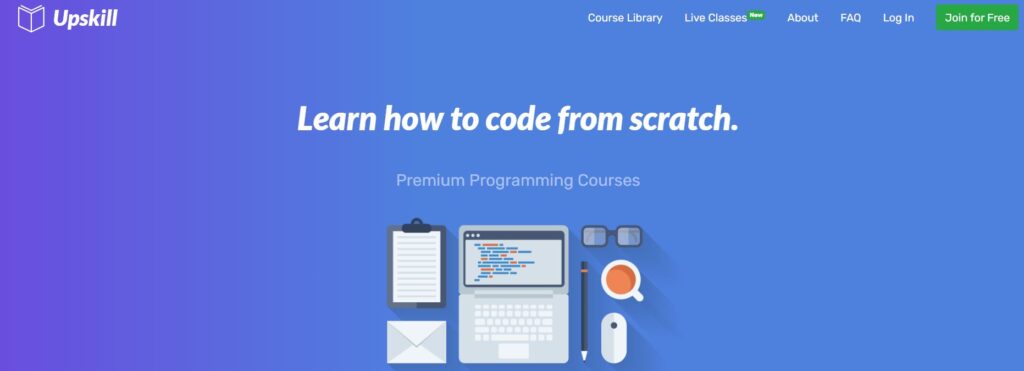
Upskill is an online learning marketplace that provides video courses on business, technology, and design skills. Course hosts upload and update content, setting their own pricing. The platform handles course discovery, playbooks for learning paths, AI-based course recommendations, and offers marketplaces for freelance work. Some providers offer certifications and accreditation for finishing courses.
Pros
- Easy to find the latest tools, frameworks, or concepts in tech fields.
- Built-in marketplaces for finding freelance work or jobs using the skills learned.
- Easier to build skills through guided progressions rather than randomly selecting content.
- Plenty of choices for continuous learning. Thousands of courses on a range of in-demand skills.
Cons
- The platform is not freely available.
- Predominantly based on watching and listening to course videos.
- Some paths may lead to dead ends without verified competencies.
edX
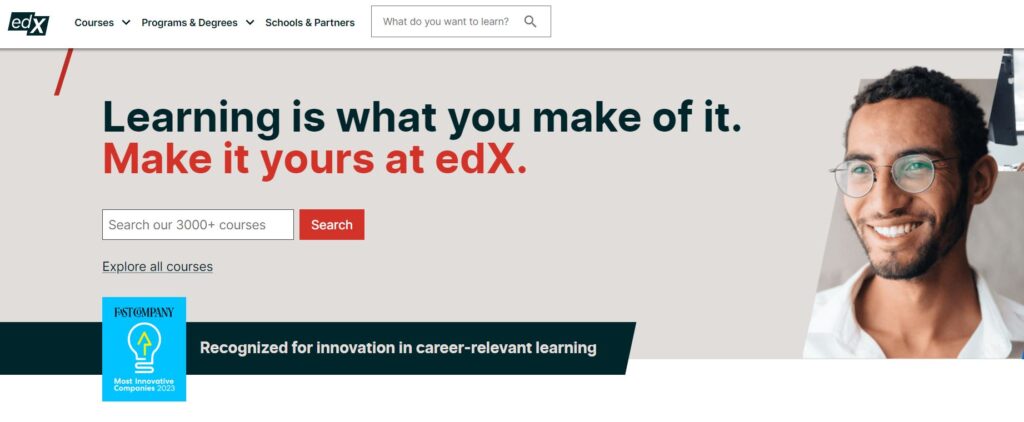
edX is a non-profit online learning platform founded by Harvard and MIT. It offers courses on various academic subjects like STEM, humanities, business, economics, and arts/design. Providers include top universities, organizations, and researchers from around the world. Course formats include video lectures, interactive modules, quizzes, problem sets, and discussion forums. Some courses offer verified certifications upon completion.
Pros
- Educational resources of the highest quality.
- Lifelong learning opportunities available to all.
- Interactive features promote an engaging learning experience.
Cons
- Difficult to navigate resources without guidance.
- Not all learning paths lead to accredited qualifications.
- Resources better suited for developing subject matter expertise rather than job-ready abilities.
Envato Tuts+
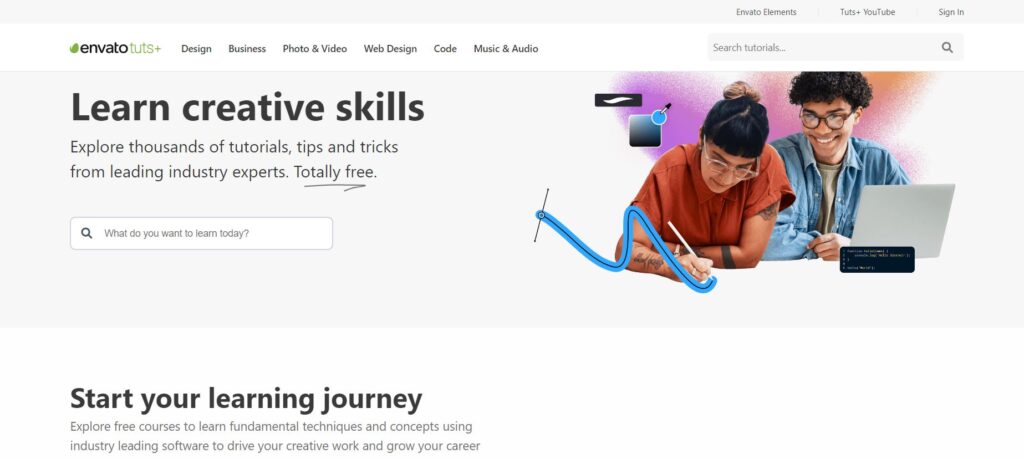
Envato Tuts+ provides a community and marketplace for learning web design, development, marketing, and graphic design. It contains video tutorials, written guides, free and paid abstract assets like photos and icons, job boards, news, and discussion forums.
Pros
- Job Board to find remote work opportunities and post job listings.
- Options to buy low-cost or free assets like photos, icons, templates, etc.
Cons
- Focus is on multiple disciplines rather than specializing in any one. Coding or programming content is limited.
- Mobile-focused but lacks features for learning coding, data science, or software engineering. Primarily designed for web professionals.
Udemy
Udemy is a marketplace for video courses on business, technology, marketing, personal finance, and more. Instructors upload courses that Udemy hosts and distributes on its platform and mobile apps. Courses include video lectures, projects, tests, and hands-on examples. Some courses offer certifications of completion.
Pros
- New courses are uploaded frequently.
- Thousands of video courses covering diverse topics. Options to learn almost any subject.
Cons
- A limited selection of high-quality free courses.
- Limited interactive features. Mostly passive watching and listening.
- Mixed quality of courses. Some flawed or outdated content slips through.
- The overhead of weeding through many low-quality paid courses to find useful ones.
Free Code Camp
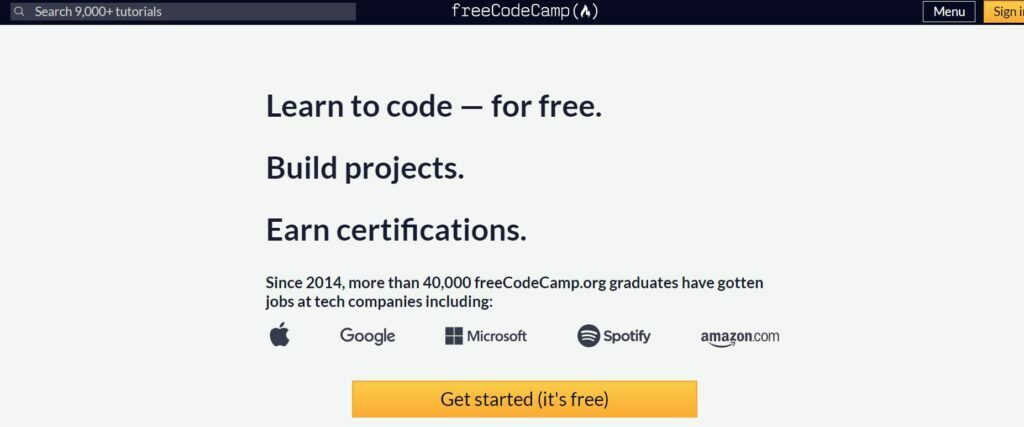
Free Code Camp is a non-profit organization providing free coding courses and tools for people of all backgrounds. Courses are available for learning front-end and back-end web development skills using languages like HTML, CSS, JavaScript, Python, SQL, and React. Projects include building real web apps and open-source tools that are contributed back to the community.
Pros
- Entirely free courses and resources.
- Learn in-demand skills relevant to tech jobs.
- Structured curriculum with a set path for progressively learning coding skills.
- Projects encourage applying knowledge. Build and contribute open-source tools.
- A diverse community of contributors, mentors, and students. Get help from others learning or already proficient in coding.
Cons
- Resources are limited if you want to skip around.
- Projects require time and dedication to build real applications.
- May lack some theory or conceptual coverage for those new to coding.
- No courses for other domains like mobile apps, software engineering, data science, etc.
Codecademy
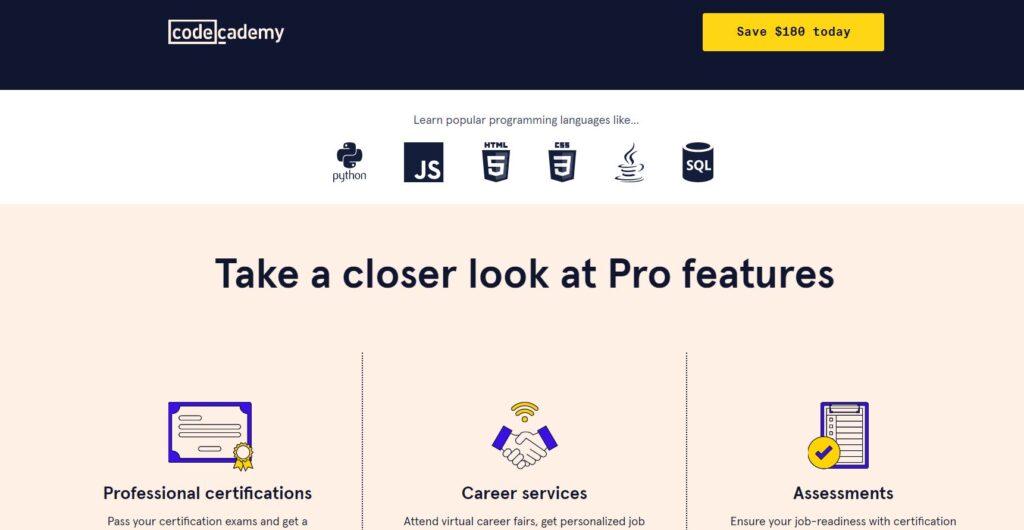
Codecademy is an online interactive coding school that offers courses on popular programming languages like Python, Java, JavaScript, Ruby, PHP, C++, and SQL. Challenges involved in the Courses are interactive coding challenges, tutorials, in-browser coding environments, and project workspaces. Practice projects range from beginner to intermediate difficulty.
Pros
- Track progress and get real-time feedback.
- Codes compiled and run right within the browser.
- Projects apply knowledge and get experience solving problems.
- Structured courses with interactive coding challenges and projects to learn code.
Cons
- Prepares for coding as a limited, entry-level skill only.
- Stop-start approach of progressing only after mastering each short topic.
Sololearn
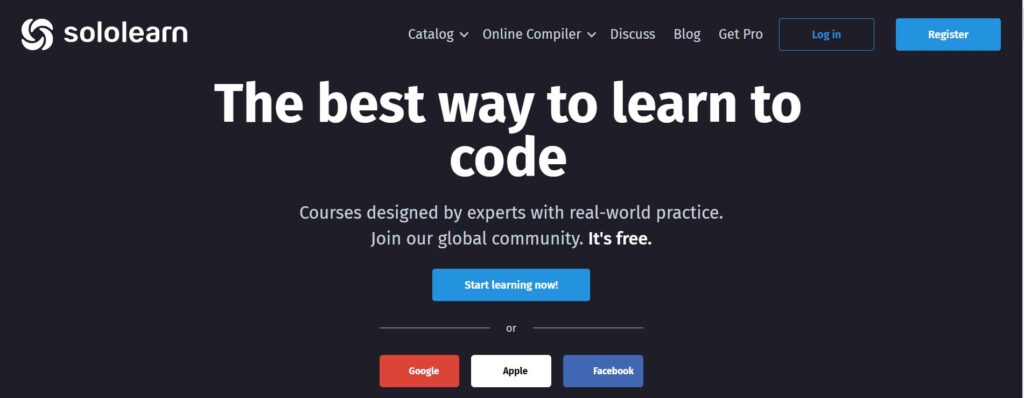
Sololearn is a free mobile and web app for learning how to code. It contains short video lessons and interactive coding exercises in popular programming languages like Python, JavaScript, C#, C++, Java, SQL, Ruby, etc. Lessons start from beginner topics and progress to more complex algorithms and data structures. Users can practice coding challenges, build projects, participate in hackathons, and connect with other developers.
Pros
- Entirely free to use with a focus on coding and programming.
- Suited for learning at any pace or skill level. Content progresses from basic to advanced topics.
- Available on mobile and web. Code from anywhere.
- Optional mentorship programs and hackathons to enhance learning.
Cons
- No courses or resources for other in-demand skills like design, marketing, finance, etc.
- Lacks deeper theory lessons or interactive explorations of concepts.
- Mobile-focused but no guaranteed high-quality learning experience.
Alison
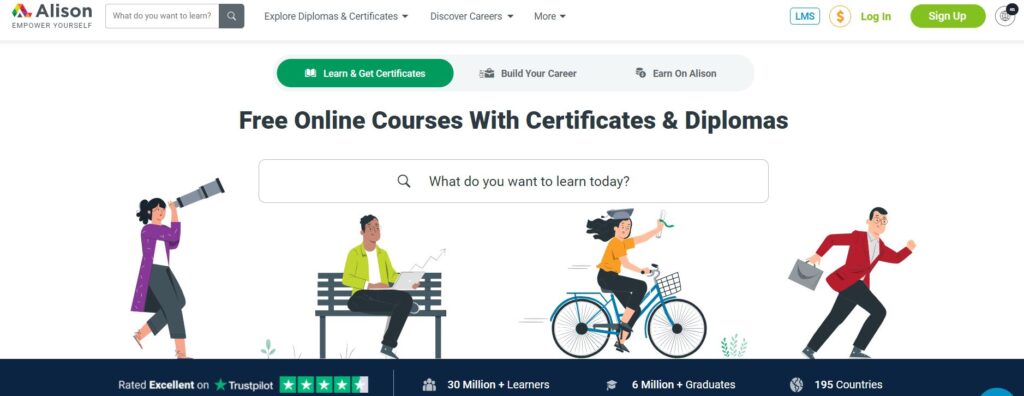
Alison is an online educational platform offering qualifications-focused courses with accredited diplomas and certificates. Courses include video lectures, interactive modules, assignments, community discussions, and mentor support. Over 3,000 courses are available in business, IT, health & social care, education, and counselling. Courses can be completed independently, and exams occur at scheduled dates or testing centers.
Pros
- Courses accredited by reputable awarding bodies like City & Guilds and ILM.
- A breadth of options allows finding specialized areas of interest and developing diverse and interdisciplinary skill sets.
Cons
- mostly require paying course and administration fees.
- An overwhelming range of options could seem unnavigable without guidance.
- May lack some flexibility or suit students preferring a broader range of subjects over depth in any area.
Importance Of Code Learning
Learning how to code is extremely important in today’s digital age for several reasons:
- Develops thinking skills: Coding helps develop logical and computational thinking skills that are useful across disciplines. Skills like problem-solving, algorithmic thinking, logic, and analysis are fundamental for success in many 21st-century careers.
- Drives innovation: Coding fuels innovation by enabling the development of new technologies, apps, websites, software, and systems that improve lives and transform industries. Many innovations originate from coding talent. Code Learning allows for innovating and building things that did not exist before.
- leads to in-demand jobs: There is a high demand for coding talent across many sectors, including technology, finance, healthcare, education, and more. Jobs like software engineers, web developers, data scientists, and UX designers are highly employable and pay competitively. Coding opens the door to many stable and lucrative career opportunities.
- Enhances productivity: Coding skills can be applied to automate repetitive tasks, analyze data, create customized tools, and integrate systems. This leads to significant gains in productivity, efficiency, and accuracy. Even non-technical roles benefit from coded tools and systems. Coding makes people and businesses more productive.
- Improves problem-solving: Coding teaches the process of breaking down complex, open-ended problems into steps that can be followed logically to reach a solution. This analytically-focused and systematic approach to problem-solving can be applied in any field to improve performance, overcome obstacles and achieve goals.
- Enables automation: Coding provides the ability to automate mundane, repetitive and manual tasks using software bots and scripts. Frees up time and mental space to focus on more meaningful and engaging work. Automation multiplies productivity and improves the quality of life.
- Creates valuable digital content: Coding skills can develop websites, mobile apps, online courses, ebooks, podcasts, videos, games, and more. Allows people to create and share digital content that educates, entertains, enriches lives, or brings value to businesses. Content creation fosters entrepreneurship and innovation.
- Supports innovation in emerging fields: Many emerging fields like artificial intelligence, machine learning, blockchain, virtual reality, and robotics depend on strong coding foundations. Learning how to code at a young age helps build a base of technical talent to drive progress in these cutting-edge and important areas of innovation.
In the end, learn to code can be a daunting task, but with the right tools, it can be an enjoyable and rewarding experience. Codecademy, and FreeCodeCamp, are some of the best websites for learning to code. Coursera, edX, and are some of the best online courses for learning to code. SoloLearn is one of the best applications for learning how to code. With these tools, you can start your journey to becoming a skilled programmer today.
FAQs
Do I need a degree to become a coder?
No, a degree is not necessary to become a coder. Many successful coders are self-taught or have learned through coding bootcamps or online courses.
What programming language should I learn first?
The programming language you should learn first depends on your goals and the type of projects you want to work on. Python is a popular language for beginners, as it is easy to learn and has a wide range of applications.
How long does it take to learn to code?
The amount of time it takes to learn to code varies depending on the individual and the amount of time they can dedicate to learning. However, many individuals can become proficient in programming in a few months to a year.
Can I learn to code for free?
Yes, many free resources are available for learning how to code, including online courses, tutorials, and coding challenges. However, some resources may require payment for more advanced courses or certifications.
What are some jobs I can get with coding skills?
Coding skills can lead to many job opportunities, including software developer, web developer, data analyst, and cybersecurity analyst. Many businesses are also looking for employees with coding skills to help them stay competitive in the digital age.

